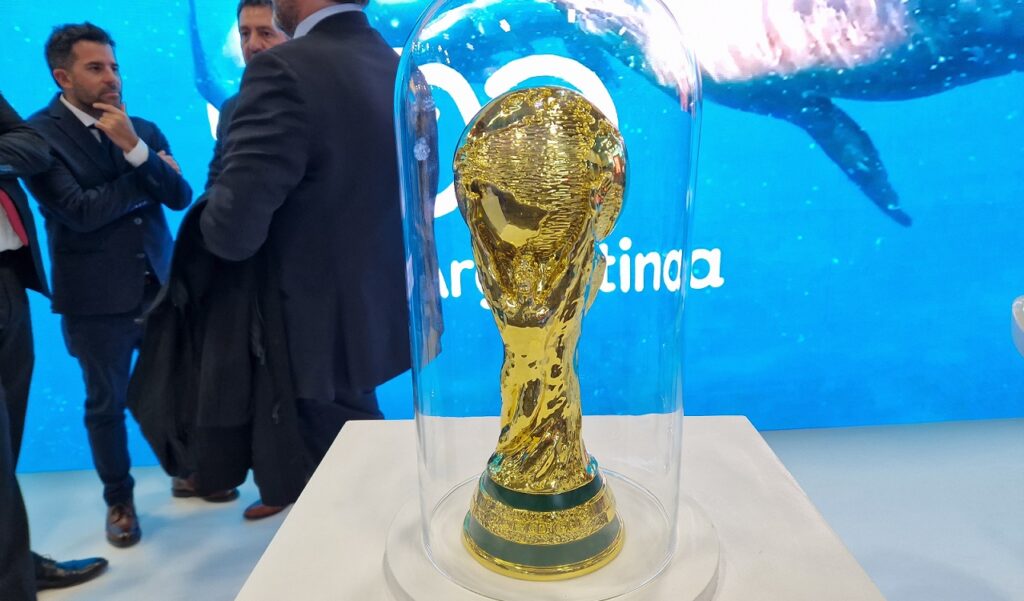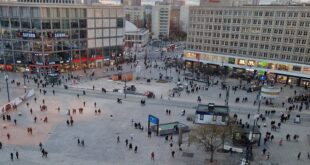Lionel Messi, probably the greatest player to have graced a football pitch, finally laid his hands on the greatest prize in the game, as his Argentina side downed France in the Qatar 2022 World Cup Final. Meanwhile it was mixed fortune for Africa’s representatives at the Mundial, with Morocco’s Atlas Lions roaring all the way to the semi-finals. Our Contributing Editor, Michael Nnaji, reports.

The FIFA Mens’ World Cup, pictured here at the stand of Argentinia at the 2023 ITB in Berlin, the most prestigious sporting trophy/Photo: AfricanCourierMedia
——
Setting the stage
The controversies raged even before a ball was kicked, with accusations and counter-accusations of bribery and corruption leading to the award of the hosting rights to Qatar, the first Arab nation to host the FIFA Mens’ World Cup.
Reports of human rights abuse, maltreatment of migrant workers (many of whom were reported to have died during the construction of stadia used for the event) and disregard of LGTB rights only served to exacerbate issues off the pitch. One British newspaper cynically dubbed it the “World Cup of Death”.
FIFA president Giani Infantino further raised the temperature by giving a rather bizarre press conference ahead of the showpiece in which he admonished the West for being overly critical of the Qataris, while imploring them to remove the log in their eyes before taking off the speck in another’s, referencing Europe’s dark history of barbarism, slavery and colonialism. He then veered off course into an absurd poetic monologue in which he claimed he felt “gay, African, Arab, like a migrant worker …”. (it bears saying at this point that Infantino is a Swiss national that resides in Doha, enjoying all the perks that his posh office brings with it).
A World Cup of Upsets
But once the football began, these issues were submerged to the background. But only just. The football was at times scintillating as it witnessed one shock result after another. Traditional football powerhouses were put to the sword by supposed minnows as the latter threatened to establish a “New World Order”.
Witness Japan beating both former winners Germany and Spain to make it out of their group. Or France losing to Tunisia in their final group game (admittedly a dead rubber following France’s qualification to the second round); or for good measure, Saudi Arabia beating Lionel Messi’s Argentina in their opening game to end the latter’s 36-game unbeaten run. Brazil, who were heavily favoured by bookmakers to win their sixth trophy were surprisingly bundled out by Croatia in the quarterfinal, sparking soul-searching in Rio. Germany, four-time winners, meanwhile, failed to even make it out of their group. Giant killers Morocco dumped out the Spanish in the second round. Qatar 2022 was described as the most democratic World Cup, with the quarterfinals featuring at least one team from every continent.
African Participation
The performances of Africa at the World Cup were a rather mixed bag. Represented by Ghana, Cameroon, Tunisia, Morocco and Senegal, Africa experienced varied fortunes. While Ghana, Cameroon and Tunisia were unable to make it out of their respective groups, Senegal and Morocco qualified for the second round, with Atlas Lions of Morocco making it all the way to the semi-finals, the first African or Arab country to achieve such a feat. Senegal were dispatched in the second round by the English after playing bravely in the first half of the game.
The Atlas Lions, in reaching the final four, surpassed the achievements of Cameroon (Italia ‘90), Senegal (Japan & South Korea 2002) and Ghana (South Africa 2010), who all made it to the quarterfinals. In doing so, the Lions continued their pioneering exploits at the World Cup having been the first African country to win a point at the Mundial (West Germany 1974) and also the first to win their group (Mexico ’86).
Managed by the erudite Walid Regragui, who only took over the team weeks before the tournament, they wowed neutrals with their disciplined defending and quick transitions, giving rise to heroes like Ashraf Hakimi, Roman Sais, Sofiana Boufal, Hakim Ziyech. They finally ran out of steam against Croatia in the semis, missing several key players due to injury.
Atto Addo, the Ghana coach, bemoaned the fact that the five meagre slots awarded to Africa at the competition limited the chances of its flagbearers dominating the latter stages of the event. Perhaps with FIFA still contemplating an extended 32-team format at the next World Cup, that theory will be put to test.
However, there is no gainsaying the fact that the preparation of African countries for the World Cup has traditionally been shabby, undermined by administrative deficiencies and the lack of the application of cutting-edge coaching techniques and sports science. There is no guarantee that the award of more slots to the African Confederation would result in greater participation in the knockout stages.
The Denouement
Inevitably, the boys were separated from the men, with the final featuring two of the world’s football powerhouses in Argentina and France.
The final was, especially in the opening hour or so, a rather disappointing affair. The French, lauded in the run up to the final for their pragmatism and good game management, essentially failed to turn up and never got going, as the Albiceleste from Argentina were constantly on the front foot. A viral disease outbreak that had hit the French camp apparently took its toll, as they looked ponderous and out-of-sorts. Even the usually menacing Klylian Mbappe initially failed to find his spark.
The final featured two teams that were gunning for their third title, Argentina having emerged victorious at the 1978 World Cup (which they hosted) and in 1986 in Mexico; France, on their own part, had won the title on home soil in 1998 and four years ago in Russia.
There were different subplots to the game, but none other dominated the headlines than the Messi vs Mbappe narrative, both club mates at the French club, Paris Saint Germain. One other subplot was that of Messi finally equalling the great Diego Maradona by winning a World Cup with his home country Argentina.
Football romantics fervently hoped to see Messi, one of the world’s ever greatest players lift the World Cup and finally cement his place in the Pantheon of the all-time greats. Argentina were two up before half-time, thanks to goals by Messi (a converted penalty after a foul on Angel Di Maria; his sixth goal of the tournament) and another by Di Maria, after a sumptuous team play from the Argentinian half. It was looking to be a “Messi Affair” before Didier Deschamps, the French manager, rang the changes.
France were thereafter a different proposition and came back right into the game with a quickfire double from Mbappe. The game sparked into life and the Argentinians were suddenly on the backfoot and were ragged by Le Bleus. Messi, so influential before then, became suddenly subdued, aside from a sizzling shot just outside the D, forcing Hugo Lloris into a brilliantly save just before the end of regulation time. Otherwise, the Albiceleste huffed and puffed, with France going for the jugular.
However, the Argentina managed to find an extra gear in extra time and pinned backed the French in a captivating heavyweight battle. Argentina were the first to find a breakthrough, with Lloris parrying a fierce from the Argentina substitute, Lautaro Martinez unto the path of Messi, who tapped in the rebound to set the Albiceleste on their road to glory.
It was Argentina’s sixth World Cup final (only Germany with eighth has played more). Thereafter the Argentines just simply battened the hatches, looking to deny France an unlikely comeback. There was, however, a twist in the tale four minutes before the end of extra time, when an Argentine defender was adjudged to have handled the ball in the penalty area while attempting to block an Mbappe shot. The referee pointed to the spot and Mbappe dispatched the resultant penalty with aplomb to make it 3-3.
From then on it was end-to-end stuff, with both teams looking to avoid the lottery of penalty shootout. There were chances at both ends to win the game in extra time but it was not to be. And so, it went to sudden death. It seemed to have been written in the stars for Messi, as Argentina triumphed 3-1 in the penalty shootout, their first win since 1986, following heartbreaks in 1990 and 2014 (on both occasions to Germany).
The Highlights
> Player of the Tournament (Golden Ball winner): Lionel Messi.
> Golden Boot Winner (for the highest number of goals scored): Kylian Mbappe (8 goals)
> Best Game of the tournament: The final, by a mile. It started as a slow burner, but then flicked into life in the latter stages. Six goals in regulation time, with the sides two best players instrumental.
> FIFA’s Team of the tournament and Best supported team of the tournament: Undoubtedly Argentina. A reported 40,000 fans travelled to Qatar from Argentina to support the Albiceleste and they did make their presence felt. Not far behind were the Morocco supporters as neutrals and the natives switched support following the elimination of the host nation.
> My best moment of the tournament: Morocco beating Portugal to reach the semi-finals.
> Worst Moment: The death of American journalist, Grant Wahl, who died of a ruptured aortic aneurysm while covering the games for his media outlet, CBS sports collapsed in the stands and couldn’t be resuscitated.
> Next up: The next World Cup is scheduled to be hosted by Canada, Mexico and the United States, with FIFA set to introduce a 32-team format.
The author, Michale Nnaji, a physician and literary critic, is based Berlin, Germany.
 THE AFRICAN COURIER. Reporting Africa and its Diaspora! The African Courier is an international magazine published in Germany to report on Africa and the Diaspora African experience. The first issue of the bimonthly magazine appeared on the newsstands on 15 February 1998. The African Courier is a communication forum for European-African political, economic and cultural exchanges, and a voice for Africa in Europe.
THE AFRICAN COURIER. Reporting Africa and its Diaspora! The African Courier is an international magazine published in Germany to report on Africa and the Diaspora African experience. The first issue of the bimonthly magazine appeared on the newsstands on 15 February 1998. The African Courier is a communication forum for European-African political, economic and cultural exchanges, and a voice for Africa in Europe.



